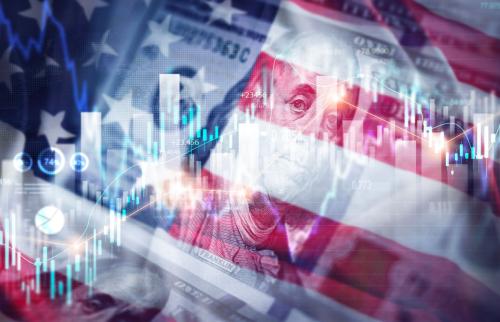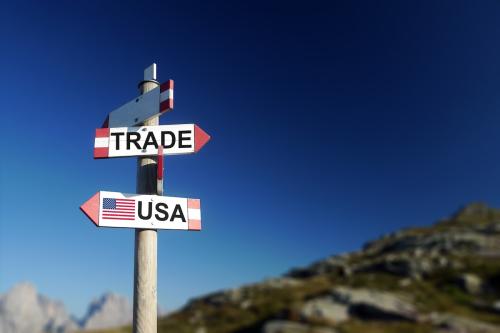If ever there was an appropriate time for a trade official to choke up in public, Susan Schwab, the U.S. Trade Representative, chose it well on July 29 at the World Trade Organization’s Geneva headquarters. It was the ninth day of a negotiating marathon to secure an agreement in the Doha Round of global trade talks. All day, rumors of a breakdown had swirled. At about 5:30, word reached us in the press room that an announcement was imminent, so reporters swarmed at the foot of the lobby staircase. Finally Schwab descended the steps, showing little of her customary steeliness.
“We were so close,” she said tremulously, then paused, struggling to regain her composure. Describing the outcome as “very disappointing,” she confirmed that a deal under consideration “is not going to carry the day.” She blurted a few sentences about the United States’ commitment to exercising leadership on trade, then turned and walked back upstairs.
A few minutes later, after newswires had flashed bulletins reporting the collapse of the Doha talks, I checked the stock market. After all, this meeting of the WTO’s 153 member nations had been accompanied by plenty of warnings about how good news on the global trade front was desperately needed at a time of financial turbulence. To my amusement, the Dow Jones was up 210 points—and rising.
What a disconnect! Was this event worthy of tears—or a shrug? Was it momentous, so much so that a veteran trade policymaker might feel emotionally overwhelmed? Or was it just a lost opportunity to make the world a bit better, so that investors could justifiably dismiss it?
Both responses were apt. Wall Street is notoriously short-term oriented, and investors rightly see little chance that this setback in the WTO negotiations will have much impact on global commerce during the time horizon that they care about.
Trade has been expanding robustly for the past decade, and all signs suggest it will continue to do so in the next few years. A Doha pact wouldn’t have reduced current trade barriers by much; the deal on the table would have mainly required member countries to lower their “bound” tariffs—that is, the legal maximums—to levels that are still above the “applied,” or actual rates. This is not to say that the deal was devoid of substance; a reduction in bound tariffs would have been highly desirable, by constraining the ability of governments to raise barriers in the future. But that is hardly the sort of thing that causes heart palpitations on Wall Street.
The serious ramifications of the events of July 29 are long-term—and this is why I think the quaver in Susan Schwab’s voice that day was warranted.
The breakdown in Geneva was the third that in the past three years for the Doha Round, which was launched in 2001 with the aim of reducing tariffs and subsidies, especially those that harm developing countries. This has raised uncomfortable questions about the WTO’s ability to continue as the central rule-writer of global trade. That in turn raises the risk that the WTO’s authority will undergo a significant erosion in years to come.
For all its flaws, the WTO is a crucial lynchpin of stability in the global economy. It is the current embodiment of the multilateral system that was established after World War II to prevent a relapse to the 1930s, when protectionism and exclusive trade blocs deepened the Great Depression and intensified rivalries among the great powers.
The WTO’s rules keep a lid on member countries’ import barriers, and by adjudicating trade disputes among nations, the WTO helps keep those disputes from flaring into tit-for-tat trade wars. In addition to its dispute-settlement function, the WTO is the guardian of the “most favored nation” principle, under which member nations are supposed to treat each other’s products on a non-discriminatory basis. Although this principle has often been breached, it is still a valuable bulwark against trade blocs.
The WTO’s centrality to the global trading system is already under some doubt, thanks to the proliferation in recent years of bilateral and regional trade agreements. More than 200 of these accords are currently in force. These range from the big and consequential—NAFTA being one—to the minuscule and absurd, such as Singapore’s deal with Jordan, and Thailand’s with Bahrain. The Bush administration fueled this trend by forging deals with Australia, Morocco, Oman, Central American countries and other partners.
The upshot is a sort of double whammy for the WTO. Disillusionment with its ability to set the rules of global trade is on the rise because of the repeated fiascos in the Doha talks. At the same time, the profusion of bilaterals tempts politicians to think of those deals as reasonable substitutes for multilateralism. Although the WTO is in no danger of disintegrating overnight, the danger is that its authority will atrophy to the point that member nations will start to flout their commitments and ignore the rulings of WTO tribunals. That would greatly increase the threat of trade wars and a breakdown in the system that has helped keep trade blocs and protectionism at bay.
The heightened risk of such a scenario demands action aimed at shoring up the multilateral system’s health.
Having imparted so much momentum to bilateralism and regionalism, the United States should now exercise leadership in the hope of bringing this trend to a halt. The next president should renounce intentions to pursue further bilateral or regional pacts and declare that henceforth Washington will pursue trade deals only under WTO auspices—whether these are big conventional trade rounds or more limited agreements involving individual sectors such as services. Regrettably, the response from some policymakers and commentators has been precisely the opposite. These knee-jerk free traders are calling for more bilateral trade deals, on the grounds that liberalization is stalled on the multilateral front. Although this approach might have been understandable in 1948, when trade barriers were still very high, it is short-sighted in 2008, when the liberalization process is 60 years old and the multilateral system is imperiled.
As for the Doha Round, the next president could propose expanding its agenda to include new challenges, including the food crisis and global warming change (which the WTO must confront soon, because an effective global deal on climate change would probably involve trade sanctions). That would breathe new life into a system that is sadly underappreciated for its role in keeping bad things from happening.
The Brookings Institution is committed to quality, independence, and impact.
We are supported by a diverse array of funders. In line with our values and policies, each Brookings publication represents the sole views of its author(s).



Commentary
Op-edDoha Trade Talks Collapse: What’s Next for Global Trade?
August 20, 2008